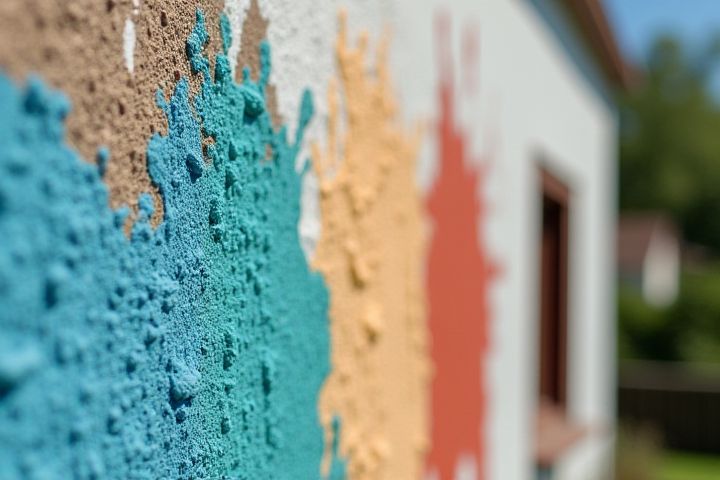
Painting a house without permission can lead to legal repercussions, especially if the property is not yours. Homeowners typically have the right to alter the exterior appearance of their property, but restrictions may apply based on local regulations or homeowners' association rules. If you are renting or living in a community governed by an HOA, obtaining consent is essential to avoid potential fines or mandated restoration. Before proceeding with any painting project, assess the risks and obligations tied to your living situation. Always consult local ordinances and property agreements to ensure compliance.
Can We Paint A House Without Permission
Local zoning laws
Painting your house without permission may violate local zoning laws, which regulate property aesthetics and neighborhood standards. These laws often require homeowners to obtain approval for any exterior changes, including paint color and finish, particularly in historic districts or homeowners' associations. Failing to adhere to these regulations can lead to fines or the necessity to restore the property to its previous state. Always check your local zoning ordinances before making any alterations to ensure compliance and avoid potential legal issues.
Homeowner association rules
Painting a house without permission from your Homeowner Association (HOA) typically violates community guidelines, which are designed to maintain property values and aesthetic standards. Most HOAs require homeowners to submit a request for approval before making exterior changes, including painting. Failure to adhere to these rules can result in penalties, such as fines or mandatory repainting to conform with approved colors. Before making any changes, it's essential to review your HOA's regulations to avoid potential disputes and ensure your DIY project aligns with community standards.
Historic district restrictions
In historic districts, painting your house typically requires adherence to specific restrictions to preserve architectural integrity and community character. Many local preservation commissions mandate that homeowners seek permission before changing exterior colors, especially if the property is designated as a historical landmark. Violating these regulations can result in hefty fines or mandated restoration costs, which can reach thousands of dollars. It is crucial to check your local guidelines and obtain the necessary approvals to avoid legal complications and ensure compliance with community standards.
Property covenants
Painting your house without permission can violate property covenants, which are legally binding agreements established by developers or homeowners' associations. These covenants often dictate specific guidelines regarding exterior alterations, including color schemes and maintenance standards, to maintain a cohesive community appearance. Ignoring these regulations could lead to fines, enforced restoration to the original condition, or even legal action from the association. To avoid potential disputes, it's essential to review your property's covenants and obtain the necessary approvals before making any changes to your home's exterior.
Environmental regulations
Painting a house without permission can violate local environmental regulations, especially if the coatings contain harmful chemicals. Many states require homeowners to adhere to specific guidelines for the use of volatile organic compounds (VOCs) in paint, which can contribute to air pollution. Failing to comply could result in fines ranging from $1,000 to $25,000, depending on local laws. To ensure your project is environmentally compliant, check with your city's regulations before proceeding with any painting endeavors.
Rental agreement terms
Painting a house without permission is generally a violation of rental agreement terms, which typically require tenants to seek approval before making alterations. Most rental agreements specify that any changes to the premises must be discussed with the landlord to maintain property standards. If you paint the house without consent, you risk potential penalties, including the loss of your security deposit or even eviction. To avoid penalties, review your rental agreement and communicate with your landlord regarding any desired enhancements.
Neighborhood aesthetics agreement
Painting your house without permission may lead to conflicts with neighborhood aesthetics agreements, which are often established to maintain a cohesive visual appeal within the community. These agreements typically dictate color schemes, types of materials, and overall styles to ensure that homes complement each other. Violating these guidelines could result in potential fines or mandatory repainting, as homeowners associations (HOAs) often enforce compliance. Before making any changes to your home's exterior, it's wise to consult local regulations and seek approval from your HOA or neighborhood committee.
Liability for damages
Painting a house without the owner's permission can lead to significant legal liabilities, especially if the paint causes damage to the property. If you choose to proceed without consent, you may be responsible for restoration costs, which can escalate into thousands of dollars depending on the extent of the damage. Legal repercussions can also include potential lawsuits for trespass or vandalism, resulting in fines that may reach up to $10,000 or more. It's crucial to understand that your actions not only impact the property owner but can also affect your financial stability.
Impact on property value
Painting a house without permission can significantly impact property value, often leading to legal and financial repercussions. Unauthorized alterations may decrease the home's appeal to potential buyers, as many prefer a cohesive neighborhood aesthetic. Repainting in unauthorized colors can also trigger disputes with homeowners' associations, further complicating your property's standing. Maintaining compliance with local regulations not only protects your investment but also enhances its marketability.
Noise and nuisance ordinances
You must consider local noise and nuisance ordinances before painting your house, as these regulations often dictate acceptable hours for activities that may generate sound or disturbances. Many municipalities restrict construction and loud activities during early morning or late evening hours to maintain neighborhood tranquility. For example, in some areas, the permissible hours for exterior painting may be limited to 8 AM to 6 PM on weekdays and 9 AM to 5 PM on weekends. To avoid fines or complaints, it's advisable to check your local ordinances and, if needed, obtain any necessary permits before starting your painting project.
